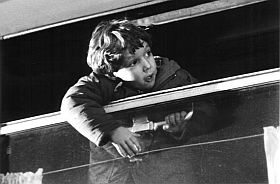


Jarmo Jääskeläinen: Marcel Lozinski

This text about Polish master Marcel Łoziński is written by grand old man in Finnish documentary, for many years a producer, director and commissioning editor at YLE, Jarmo Jääskeläinen. The text is taken from the site of the international film festival Docpoint that takes place in Helsinki 26-31.1.2010:
If one were to look for a pair for Marcel Łoziński in developing Polish documentary, it would be Krzysztof Kieślowski. They were best friends, and both belonged to the generation of directors that in the beginning of the 1970s were no longer satisfied with what their teacher Kazimierz Karabasz had taught them in the Łódź film school. They abandoned realistic observation of the environment and began to look for deeper stories, often containing staged, fictive elements, that would critically portray the totalitarian system of power in their country.
The basic conflict in their films was created by juxtaposing the individual and an unrealistic system. Both Łoziński and Kieślowski encountered various forms of censorship. They developed special expertise in writing between the lines, in finding forms of expression that the handbook for censorship did not yet have a chapter on. A good example of this is Łoziński’s How to Live (1977), a story from an educational summer camp of the Union of Young Polish Socialists. Just a few months earlier, workers in Ursus, Radom and other parts of Poland had started to protest against the price increase of food supplies. Thousands lost their jobs and many of the protesters got unreasonable prison sentences. Meanwhile, the summer camp of Marcel Łoziński’s film is all dance and laughter, although there are individuals present who dissent. Many of his other films also cannot be fully understood until they are reflected against the social circumstances in Poland at the time.
Kieślowski’s documentaries were often built on stories about an individual or a small group, Łoziński’s on larger themes and collectives. This difference led
Kieślowski to fiction, and Łoziński found new ground in Poland’s unspoken history. These films will not be seen in DocPoint’s retrospective this year, but I will mention two examples: the 1988 film Świadkowie (“Witnesses”) that deals with the butchering of Jewish war survivors by the Polish in Kielce in 1946, and Las Katyński (“Katyn forest”), completed a year later, in which the families of Polish officers that were murdered by the Soviet secret police NKVD in spring 1940 visit the execution sights, where the bodies of the thousands that were shot on political grounds lie.
Teaching young documentary directors is an area where Kieślowski and Łoziński are almost on par. Kieślowski established a university media department in Katowice, where he taught for over ten years. Lozinski was involved in establishing the Andrzej Wajda Master School of Film Directing in Warsaw. He is in charge of studies in documentary film directing. It is hard to find a young or middle-aged documentarist in contemporary Poland who has never studied under Kieślowski or Łoziński.
And finally, when I am asked which Łoziński film I like the best, the answer is short and simple: 89 mm from Europe (1993). The distance between the wheels of a passenger train coming from the West is changed, because the gauge will be 89 millimetres wider, when the journey continues east from the Belarusian city Brzesc. Work goes on as if nothing unusual were happening, and the workers look gloomy. Western tourists peek out from the windows of the passenger carriages. This is the border between East and West – between Rome and Constantinople. Finland, too, is 89 millimetres away from Europe.
Still from “89 mm from Europe” by Marcel Lozinski. Polish Film Institute has published a dvd box with documentary films of Marcel Lozinski.
Jarmo Jääskeläinen
Translation by Anna Volmari